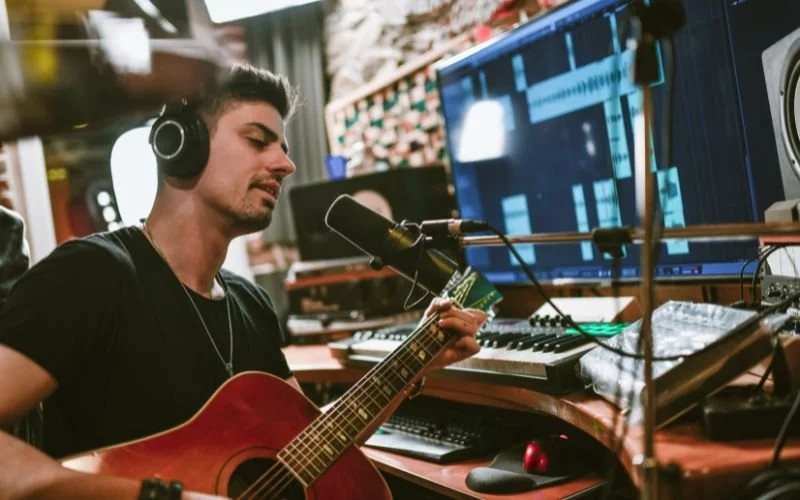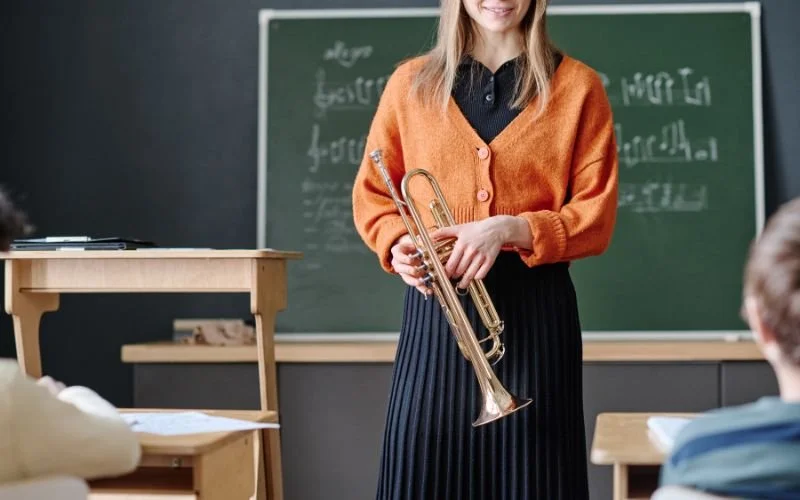Take advantage of the vacations to practice your instrument: tips and tricks!
At last, the long-awaited summer vacations are here! This is your chance to relax or get away from it all for a holiday by the sea or in the mountains. Clear your head: that's the program! Relax, d'chord, but don't put your piano or guitar training on hold or risk losing all those reflexes you've acquired over the year.
That's right! Maintaining regularity in the practice of an instrument is almost indispensable for professional musicians or children just starting out in music. Fortunately, there are a whole host of activities available to help you brush up on your musical skills, at home or during a summer holiday, with or without your instrument! Newzik brings you its tips and tricks so you can make the most of your well-deserved vacation without forgetting a single scale.
Continue practicing your instrument at home or remotely during the vacations
Regularity: a musician's best ally
Even on vacation, regular practice of musical exercises to develop your musical skills will help you to keep your hand on your instrument and maintain a good level.
It's true that you're on vacation and don't have many instruments in your suitcase. But don't worry: whether you're at home or 1,000 km away, it's possible to keep practising and relax at the same time. Music professionals recommend fun activities, alone or in a group, such as a short essay on the life of a composer, or rereading sheet music from your beach towel. The priority for apprentice musicians is to have fun while resting their minds.
Music teachers are unanimous: musicians and singers are like athletes: if they don't work on practicing their instrument, they can become "soft" and lose their reflexes.
Perform musical exercises adapted to your instrument
While a period of rest without an instrument is useful, it's a good idea to schedule a few regular music practice sessions.
A singer needs to rest his voice to regenerate his vibrato in the event of vocal cord fatigue. But it's still important for him toperform a few simple singing exercises to awaken and maintain his vocal vibrations. Blowing into a straw and holding the sound for a few moments, or saying "M", "I" or "OU" while holding the notes, allow the body to feel the vibrations through the nose and lips. Even if the voice is not placed, it can be exercised with gentle singing.
For violinists and pianists, practicing in the tent or camping pool is not recommended, but don't panic: wherever you are, you'll always find a way to immerse yourself in an exercise. If you have the instrument in your possession (keyboard or violin), give yourself a vacation ritual to isolate yourself and work away from noisy areas. Rehearse pieces you've mastered, work on your musicality or practice your technique by working on your scales and gestures. Warm up your fingers, hands and wrists to maintain your agility on a daily basis while you're away.
Guitarists, meanwhile, can rehearse wherever they like, whether sitting by the fire or at the foot of the mountain. Playing a few tunes on the guitar on a regular basis for fun with friends and family is a good way to keep your fingers dexterous. But don't forget to respect your sheet music by playing the tunes correctly. Without working on the notes, simple "empty string" exercises also help you to keep your technical skills up to date and maintain your touch and musicality. Simply vibrate each guitar string along its entire length, without modifying it by pressing your fingers against the neck.
Piano, guitar, saxophone, djembe, harp, ukulele... Whatever your instrument, the key is to set aside some time for revision so you don't lose any of what you've learned!
📱 Do you belong to an orchestra and need to practice remotely while proofreading your bandmates' annotations? Try the NewzikEnsemble and access all score updates in collaboration with the conductor and other musicians in the orchestra!
Revising without overloading your suitcase: it's possible!
Unable to bring your grand piano with you to the Seychelles? Nor is it certain that your camping neighbors will appreciate the clarinet between two naps. The good news is that today it's easy to practice music without your instrument, thanks to video games and dedicated applications.
Without an instrument, you can work on your rythm and note memory. Indulge yourself! Take advantage of your vacations to study scores of pieces you'd like to discover in peace and quiet, without any pressure. Find sheet music that motivate you and that you dream of mastering in the autumn.
Try to "keep the rythm " on your own or with the help of a mobile metronome. Clap your hands, work on the independence of both hands by performing different gestures simultaneously on each hand. Blacks on one side, sixteenth notes or rounds on the other: try to coordinate your mind!
Review and create your own scores online, or try your hand at composition. Do you have a paper score book or a PDF score? Try the LiveScore. Thanks to this Newzik feature, you can bring a paper or PDF score to life by transforming it into an interactive score, and let it play!
Alone, with family, friends or your rock band, brush up on the basics of music theory and solfeggio while immersing yourself in the songs you love.
☀️ Going far away and unable to bring your musical instrument with you? Take all your scores with you on your tablet, and rehearse remotely with complete peace of mind, thanks to the cloud and the features of the Newzik !
3 tips for revising your scales on vacation
Would you like to continue practicing your musical instrument, but are you going to be on your own or with your family all summer? Don't give up! Here are some ideas to keep you going over the vacations.
Listen to music and read sheet music
As an amateur or professional musician, you're a big music consumer. Here's a tip for learning sheet music without even touching your instrument: listen to music! It's a real technique for working on your musical ear. There's nothing like a long summer evening listening to playlists by your favorite composers or musicians and discovering new instrumental extracts!
Once your brain has registered a piece of music, it will be easier for you to read the notes on the score. For children, listening is an indispensable means of supporting sound memory and develop musical awareness.
Why not take advantage of the vacations to learn more about a musical style you don't listen to during the rest of the year? Are you more into pop or rock? Listen to a piano tune, classical music or jazz to enrich your musical knowledge, (re)find inspiration and maybe discover a new passion!
2. Singing to maintain your pitch
If it's difficult for you to play notes on your instrument, play them while singing! Singing is also a great way to train your memory and musicality.
Singing is used by music teachers to help their students learn rythm and the notes. To review, do a few vocalizations to wake up your vocal cords, then sing the notes in your full voice. This exercise is ideal for memorizing your musical tunes!
3. Book courses or private lessons
Are your music teachers away all summer? Would you like to continue practicing a musical activity during your vacations while improving your skills? Book one-hour weekly workshops or private lessons, either face-to-face or remote can be a great way to stay in touch with your musical instrument and stay motivated.
Working alongside a new teacher can also be an opportunity to adapt to new teaching methods and to brush up on shortcomings, so as to be more effective when the new school year starts. Find out about courses and internships near you! You can choose the frequency of your music course according to your personal needs, preferences and availability.
🎶 Review in interaction with your music teacher thanks to NewzikEducation ! Your teacher accesses your scores remotely, allowing you to revise and annotate your score tables remotely.



